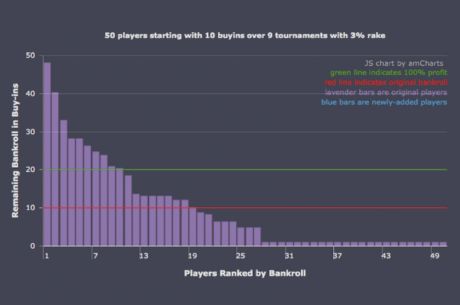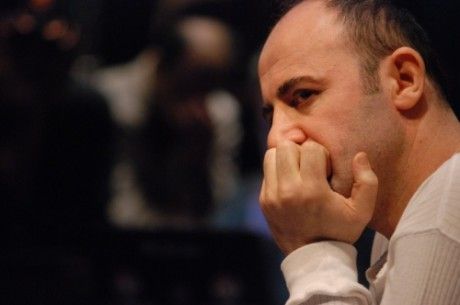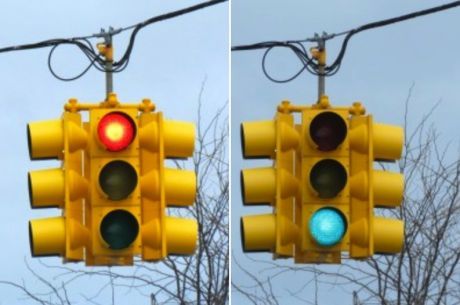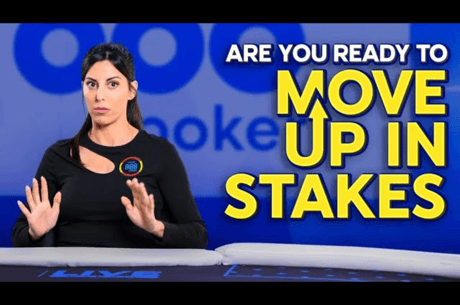Thinking Poker: Getting Started With Hand Reading, Part 2
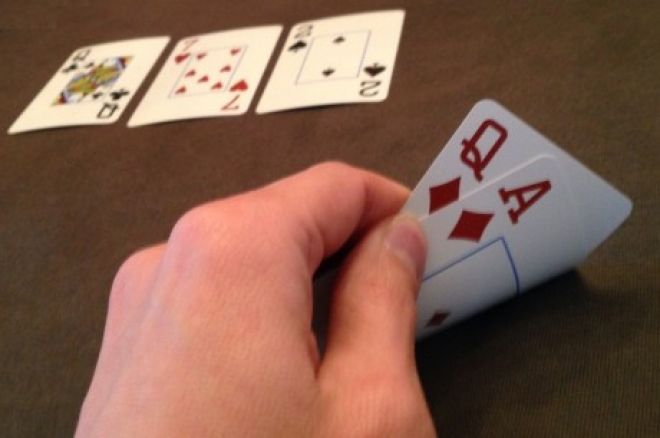
In Part 1 of this article, I argued that hand reading isn��t as complicated as it��s made out to be. You don��t have to zero in on your opponents�� exact holdings to get useful information. Often, simply identifying a few hands they aren��t likely to have can be a big help.
Specifically, we looked at an example where you raise with A?Q? and, along with a few of the loosest players at the table, see a flop come Q?7?2?. Even loose players don��t generally call raises with 7x2x-offsuit, and Part 1 concluded that although it��s possible for someone to have outflopped you, it��s quite unlikely.
In the end, though, there��s no prize for probably having the best hand on the flop. What we really want to know, and what we��ll consider now, is whether you can still expect to have the best hand when a lot of money goes into the pot.
This is where a lot of players go wrong, or think they went wrong when they actually made a good decision and just got unlucky. Your primary hand reading goal, when you have a strong hand, should not be to suss out whether someone has something even better and find a fold. You are supposed to put a lot of money into the pot with strong hands, even if that means sometimes paying off something even stronger.
Your primary hand reading goal is to figure out when your hand is strong enough that your opponents will play a big pot with many weaker holdings, and then to determine how best to do that. It��s not about always being ahead, it��s about being ahead more than half of the time.
Many players are afraid to play a big pot with one pair, even a very good one. They worry that if they show too much strength, their opponents will fold unless they can beat top pair.
Paradoxically, these are often the same people who complain about how loose their opponents are and how ��they could have anything.�� The best way to take advantage of excessively loose players is to lower your standards for what counts as a strong hand. You need to recognize when your opponents will put money into the pot with many hands worse than yours, then you need to get that money into the pot.
Let��s think again about what it means to say that these players are ��loose.�� Presumably it means that they don��t like to fold when they have a pair, especially if it��s top pair. Since you can beat almost any one-pair hand, you should be eager to get a lot of money into the pot.
We��ve already decided that there are roughly 16 combinations of better hands you might run into after flopping top pair, top kicker with your A?Q?. How many worse hands are there? If your opponents really are playing any two suited cards, there are a lot of ways for them to have worse that a pair of queens.
First there are two queens left in the deck, and nine different kickers worse than yours, which makes for 18 combinations in all. So already we��ve counted more combinations of dominated queens than there are sets or two pairs, and we��re just getting started.
Probably these players will play stronger queens like KxQx or QxJx even if they aren��t suited. If they are really loose, maybe they will be reluctant to fold pocket pairs or a flopped pair of sevens.
We could count all these combinations, but we don��t have to, and of course you won��t be doing that in real time while you��re playing anyway. All you have to do is recognize that it��s a lot easier to flop one pair than two pair and that you beat any one-pair hand your opponents are likely to have (except for AxQx, against which you would chop the pot).
In short, your analysis of this situation should boil down to a few simple statements:
- My loose opponents will call sizable bets with any decent one-pair hand.
- Based on the action so far, they could easily have flopped such a hand.
- I can beat virtually all of those hands, and there are very few hands that could beat me.
- Therefore, I should bet for value, expecting to be well ahead of the range of hands that will call my bet.
You��ve seen that word ��range�� before in the context of poker. It relates back to the original point about hand reading: you don��t have to figure out exactly what your opponents have to get really useful, valuable information. In this case, you don��t have to determine with certainty that you have the best hand, nor that you will still have the best hand if a lot of money goes into the pot. You simply have to recognize that, based on the situation and what you know about your opponents, you��ll usually be ahead if a lot of money goes in.
All that��s left to do is to find the best way to put that money in. You might be tempted to check as a ��trap,�� but when you��re dealing with loose players, you��ve essentially sprung the trap already simply by getting such a good flop. Anyone who has a worse queen than you is already on the hook �� you just have to reel them in.
Every once in a while, you��ll find that you got outflopped, or that you were ahead on the flop and then got outdrawn on the turn. It happens, and importantly, it doesn��t mean that you made a mistake. As long as you correctly determined that you would usually be ahead when the money went in, then you did all the hand reading you need to do. The rest comes down to the luck of the draw.
Be sure to check out Andrew and Nate Meyvis on the Thinking Poker podcast, and for strategy articles, reviews, and more from Andrew, check out the rest of The Thinking Poker website.
Get all the latest PokerNews updates on your social media outlets. Follow us on Twitter and find us on both Facebook and Google+!

